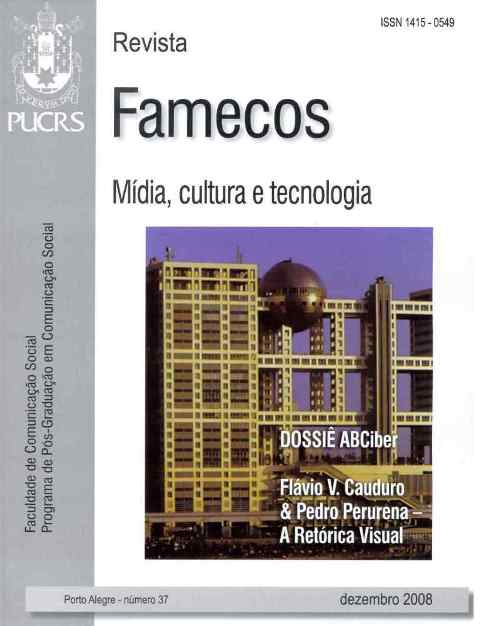Collective Intelligence: communication, cognitive capitalism and micropolitics
DOI:
https://doi.org/10.15448/1980-3729.2008.37.4801Keywords:
Collective intelligence, cognitive capitalism, micropoliticsAbstract
Collaborative processes are present in our society everywhere. Digital networks throughout the communication field popularized collaborative actions, virtual communities being its more relevant fact. On the other hand, through the immaterial labour, we will find a strong plea for collaborative networks that became a kind of mantra within the organizational world. Since a decade ago the concept of collective intelligence has been seen as a synonym of this collaboration understanding, either in communicational or labouring field. But is it the only meaning of the concept of collective intelligence? The present article is a reflection about the dimensions of the concept of collective intelligence and its opening to another dimension, the micro politics, where it is understanding as a resistance to alienation process of cognitive capitalism.Downloads
References
BECKER, G. Investiment in Human Capital: A theoretical and empirical analysis with special reference to education. Nova York: National Bureau of Economic Research, 1964.
BOURDIEU, P. Le capital social: notes provisoires. In: Actes de la Recherche en Sciences Sociales, v. 3, p. 2-3, 1980.
BOUTANG, Y. Le capitalisme Cognitif: la nouvelle Grande Transformation. Paris: Amsterdam, 2007a.
______. (org). Politiques des Multitudes. Democratie, Intelligence Collective e Puissance de la vie à l’heure du capitalisme cognitif. Paris: Amsterdam, 2007b.
BURT, R. The Network Structure of Social Capital. In: SUTTON, R.; STAWS, B. (eds.). Research in Organizational Behavior Greenwich, CT: JAI Press, 2000.
COLEMAN, J. Foundations of Social Theory. Cambridge, Mass: Harvard University Press, 1990.
COSTA, R. Por um Novo Conceito de Comunidade: redes sociais, comunidades pessoais, inteligência coletiva. In: Revista Interface – Comunicação, Saúde, Educação. São Paulo: Unesp, v. 9, n. 17, p. 235-248, mar./ago. 2005.
DELEUZE, G. Foucault. Paris: Les Editions de Minuit, 1986.
DRUCKER, P. The Post-Capitalist Society. New York: HarperBusiness, 1993.
FIGALLO, C. Hosting Web Communities: building relationships, increasing customer loyalty, and maintaining a competitive edge. Nova Iorque: Wiley Computer Publishing, 1998.
FORAY, D.; LUNDVALL, B. The knowledge-based economy. Paris: OCDE, 1996.
FOUCAULT, M. Naissance de la Biopolitique. Paris: Gallimard/ Seuil, 2004.
GRANOVETTER, M. Getting a Job: a study of contacts and careers. Chicago: University of Chicago Press, 1974.
______. Economic Action and Social Structure: The Problem of Embeddedness. In: American Journal of Sociology, v. 91, n. 3, p. 481-510, 1985.
HARDT, M. O trabalho afetivo. In: COSTA, R. & PÉLBART, P. (orgs.). O Reencantamento do Concreto. São Paulo: Hucitec, 2003.
KIM, A.J. Community Building on the Web. Berkeley: Peachpit Press, 2000.
LAZZARATO, M. Les revolutions du capitalisme. Paris: Les Empêcheurs de Penser en Rond, 2004.
______. Biopolitique/Bioéconomie. In: BOUTANG, Y. (org.). Politiques des Multitudes. Democratie, Intelligence Collective e Puissance de la vie à l’heure du capitalisme cognitif. Paris: Amsterdam, 2007.
LIN, N. Social Capital: A Theory of Social Structure and Action. New York: Cambridge University Press, 2001.
LIN, N.; COOK, K.; BURT, R. Social Capital: theory and research. Londres: Aldine Transaction, 2005.
MENDES, V. L. F. Uma Clínica no Coletivo: experimentações no Programa de Saúde da Família. São Paulo: Hucitec, 2007.
NEGRI, A.; HARDT, M. Multidão. São Paulo: Record, 2005.
NEGRI, A. Exílio. São Paulo: Iluminuras, 2001.
NONAKA, I.; TAKEUCHI, H. The Knowledge-Creating Company. New York: Oxford University Press, 1995.
PÉLBART, P. P. Vida Capital: ensaios de biopolítica. São Paulo: Iluminuras, 2003.
PREECE, J. Online Communities. Chichester: John Wiley &Sons, 2000.
PUTNAM, R.; LEONARDI, R.; NANETTI, R. Making Democracy Work: Civic Traditions in Modern Italy. Princeton: Princeton University Press, 1993.
RHEINGOLD, H. A Comunidade Virtual. Lisboa: Gradiva, 1996.
SENGE, P. The Fifth Discipline: The art and practice of the learning organization. New York: Doubleday, 1990.
TEIXEIRA, Ricardo. O desempenho de um serviço de atenção primária à saúde na perspectiva da inteligência coletiva. In: Revista Interface. Comunicação, Saúde, Educação. São Paulo: Unesp, v. 9, n. 17, p. 219-234, mar./ago. 2005.
WELLMAN, B & BERKOWITZ, S. D. Social structures: a network approach. New York: Cambridge University Press, 1988.
WOOLCOCK, M.; NARAYAN, D. Social Capital: Implications for Development Theory, Research, and Policy. In: The World Bank Research Observer, v. 15, n. 2, p. 225-249, 2000.
ZOLA, E. O Germinal. São Paulo: Companhia das Letras, 2000.
Downloads
Published
How to Cite
Issue
Section
License
Copyright
The submission of originals to Revista Famecos implies the transfer by the authors of the right for publication. Authors retain copyright and grant the journal right of first publication. If the authors wish to include the same data into another publication, they must cite Revista Famecos as the site of original publication.
Creative Commons License
Except where otherwise specified, material published in this journal is licensed under a Creative Commons Attribution 4.0 International license, which allows unrestricted use, distribution and reproduction in any medium, provided the original publication is correctly cited.






